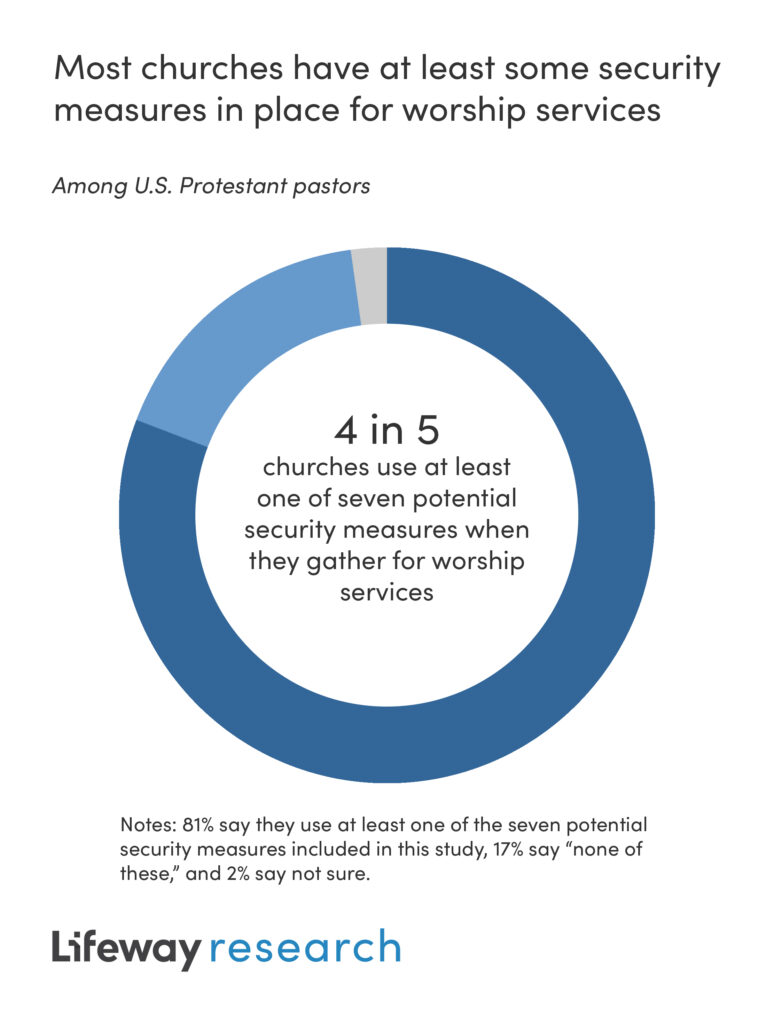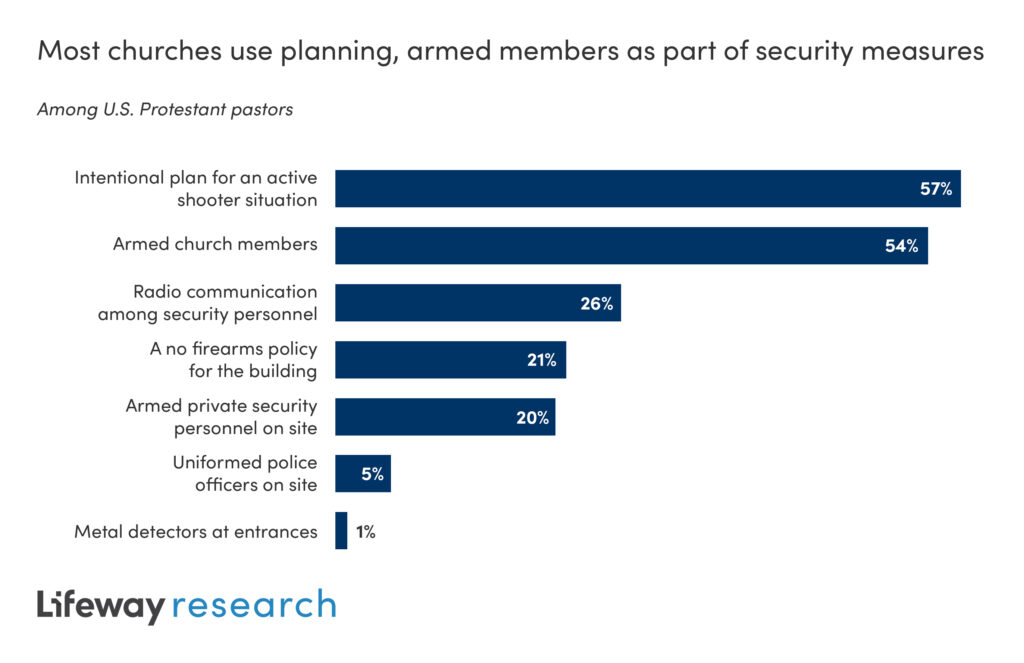
BRENTWOOD, Tenn. — Most churches have some type of security measures in place during worship services. Pastors point to intentional plans and armed church members more than other measures, but compared to three years ago, fewer say they have plans and more say they have gun-carrying congregants.
Numerous fatal shootings have occurred at churches in recent years. In March, an armed assailant killed six people at The Covenant School, a Christian school in Nashville, Tenn. Shootings have also occurred at other places of worship like Jewish synagogues and Sikh temples.
When asked about their protocols when they gather for worship, around 4 in 5 U.S. Protestant pastors (81 percent) say their church has some type of security measure in place, according to a study from Lifeway Research. Still, more than 1 in 6 (17 percent) say they don’t use any of the seven potential measures included in the study, and 2 percent aren’t sure.

“Churches are not immune to violence, disputes, domestic disagreements, vandalism and burglary,” said Scott McConnell, executive director of Lifeway Research. “While loving one another is a core Christian teaching, churchgoers still sin, and non-churchgoers are invited and welcomed. So real security risks exist whether a congregation wants to acknowledge them or not.”
Security measures
In terms of security specifics, pastors are most likely to say their congregation has an intentional plan for an active shooter situation (57 percent). Additionally, most (54 percent) also say armed church members are part of the measures they have in place.
Around a quarter (26 percent) use radio communication among security personnel, while 1 in 5 say they have a no firearms policy in the building where they meet (21 percent) or armed private security personnel on site (20 percent). Fewer have uniformed police officers on church grounds (5 percent) or metal detectors at entrances to screen for weapons (1 percent).
“Most churches are small, so security plans often don’t need to be elaborate or expensive,” McConnell said.
Around half of the fatal shootings in churches since 1999 have occurred in the South. Pastors in that region are the least likely to say they don’t use any of the security measures at their churches (12 percent). Conversely, they are among the most likely to report their congregation has an intentional plan for an active shooter situation (64 percent), radio communication among security personnel (34 percent) and armed private security on site (26 percent). Additionally, Southern pastors are the most likely to say they have armed church members (65 percent) and uniformed police officers on site (9 percent).
More worshipers in attendance often leads to increased security measures. The larger the church, the more likely it is to have armed private security personnel on site and radio communication among security personnel. Churches with 250 or more in attendance are the most likely to have armed church members (74 percent) and uniformed police officers on site (27 percent). Those large congregations are also among the most likely to have an intentional plan for an active shooter situation (74 percent).
Pastors at churches with worship attendance of fewer than 50 people (29 percent) are the most likely to say they aren’t using any of the methods of preparation considered in this study.
Mainline pastors (22 percent) are more likely than evangelical pastors (14 percent) not to use any of the seven potential ways of security preparation at their churches. Denominationally, Lutheran (34 percent) and Presbyterian/Reformed pastors (30 percent) are at least twice as likely as pastors at non-denominational (14 percent), Restorationist movement (13 percent), Pentecostal (12 percent) or Baptist (8 percent) churches to say they don’t use any of the security measures.
African American pastors are three times more likely than white pastors to say they have uniformed police officers on site (12 percent v. 4 percent). African American pastors are also more likely than white pastors to say part of their security measures includes radio communication among security personnel (37 percent v. 25 percent) and a no firearms policy in the building where they meet (34 percent v. 21 percent). Meanwhile, white pastors are more likely than African American pastors to say they have armed church members (56 percent v. 33 percent).
More guns, less planning

Compared to three years ago, pastors say they’re more likely to be relying on armed churchgoers and less likely to have a no firearms policy for their building. Fewer also say they have an intentional plan for an active shooter, compared to a 2019 Lifeway Research study.
Previously, 45 percent of U.S. Protestant pastors said armed church members were part of their congregation’s security measures. Now, more than half (54 percent) include that in their attempts to keep churchgoers safe. In 2019, 27 percent said they enforced a no firearms policy at their building. That has dropped to 21 percent now.
Churches are also less likely to rely on intentional planning to address potential security threats. In 2019, 62 percent said they had such a plan in place for an active shooting situation. Since then, the percentage of pastors who say that is the case at their church has fallen to 57 percent.
“While churches may have different convictions on how to maintain security, it is surprising that fewer churches have an intentional plan for an active shooter than did in 2019,” McConnell said. “As churches cut back on activities during COVID, this may have been one of the initiatives that did not resume for some churches.”
For more information, view the complete report and visit LifewayResearch.com.
Methodology
The phone survey of 1,000 U.S. Protestant pastors was conducted Sept. 6-30, 2022. The calling list was a stratified random sample, drawn from a list of all Protestant churches. Quotas were used for church size. Each interview was completed by the senior or sole pastor at the church. Responses were weighted by region and church size to reflect the population more accurately. The completed sample is 1,000 surveys. The sample provides 95 percent confidence that the sampling error does not exceed plus or minus 3.2 percent. This margin of error accounts for the effect of weighting. Margins of error are higher in sub-groups. Comparisons are made to a phone survey of 1,000 U.S. Protestant pastors conducted Aug. 30 – Sept. 24, 2019.
-30-
Aaron Earls is a writer for Lifeway Christian Resources.
About Lifeway Research
Lifeway Research is a Middle Tennessee-based, evangelical research firm that specializes in surveys about faith in culture and matters that affect churches. For more information, visit LifewayResearch.com.
About Lifeway Christian Resources
In operation since 1891, Lifeway Christian Resources is one of the leading providers of Christian resources, including Bibles, books, Bible studies, Christian music and movies, Vacation Bible School and church supplies, as well as camps and events for all ages. Lifeway is the world’s largest provider of Spanish Bibles. Based in Middle Tennessee, Lifeway operates as a self-supporting nonprofit. For more information, visit Lifeway.com.
















